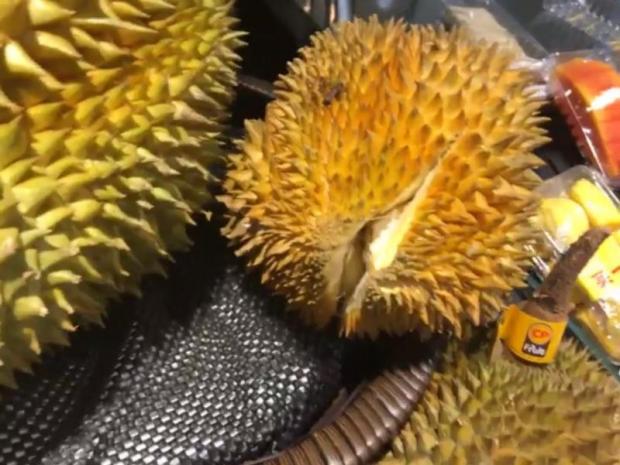
What's worse than the pungent smell of durian, variously compared by Westerners to sewage, old gym socks or, at best, rotting cheese?
The even more putrid odour of decaying durians.
It was such an unfortunate encounter in China that persuaded Assoc Prof Voraphat Luckanatinvong to do research on prolonging the shelf life of the fruit, keeping it fresh from harvest right up to the time it gets to the customer.
Assoc Prof Voraphat of Thammasat University's Science and Technology Faculty was on a work stint in the Chinese cities of Shanghai and Guangzhou when he was hit by the malodorous stink of the "king of fruits" displayed on the shelves.
Some of the durians were decomposing with the overripe flesh oozing out of the cracked hard, thorny shells, giving altogether a rather distasteful sight and smell presentation of a fruit that is much-loved in the region. In some grocery shops, the durians were just carelessly dumped in plastic bags.
Being Thai and therefore knowing how good the quality of the fruit from his country is, Assoc Prof Voraphat felt desperate and troubled by the decaying durians on the shelves and even worried about the future of Thailand's fruit exports. He thought the Chinese were willing to buy the rotten, low-quality durians after having eaten the fruit during visits to Thailand, as durians cannot be grown in China.
Putting the bad smell aside, the Chinese buyers might not have realised that the rancid flesh of the durian could be contaminated with bacteria and mould, says Assoc Prof Voraphat, 48. This could cause serious illness when eaten, which would further destroy the reputation of Thai durians, he says.
Durians must be handled properly to retain its taste as well as its cleanliness, says the professor.
"Handling durians carelessly like that could also destroy the future of thousands of Thai durian growers, as well as adversely affect millions of other fruit growers in the country," Assoc Prof Voraphat says.
Thailand produces about 600,000 tonnes of durians a year and generates more than 10 billion baht of export value each year. The massive trade value means the country has a well-thought-out and clear-cut strategy to produce high-quality durians, plus strong marketing campaigns to promote the fruit along with other fruits from Thailand that are much in demand.
Of the total production, some 380,000 tonnes of durians are for export and the rest for domestic consumption. Major export markets for Thai durians are China, Hong Kong, Taiwan, the US and Canada.
Normally it takes about two weeks for exported durians to reach China after leaving port in Thailand, and then another week before they reach the supermarkets or grocers.
That was the question that Assoc Prof Voraphat needed to find the answer for: how do you extend the lifespan of fresh durian, which normally starts to ripen within a week after being harvested?
Earlier this year, after spending a year on research, the professor finally found what he was looking for: a special way to prevent the fruit from going bad so fast. The process is called "active coating", which can make durian stay fresh for twice as long as the normal time.
What's more, the active coating technique helps not only to extend the freshness of the durian, but it also contains the smell of the ripening fruit.
Prakasit Chumcheun, a student doing a bachelor's degree at Thammasat who helped with the research, says the active coating is made when sugar-cane fibre -- the waste that comes out of the sugar-crushing process -- is blended with active carbon. This process generates a new type of fibre that when applied to the durian shell will make it stronger and prevent it ripening too fast.
"The active carbon has a good property to absorb strong, odorous smell when durian starts to mature, while the sugar-cane fibre helps strengthen its shell so it doesn't split so easily, even when it has already ripened," Mr Prakasit says.
The cost of coating the durian with the blended fibre is about two baht per fruit. The expense will be offset by the higher commercial value of the coated durians, since they can now stay fresh for longer, allowing them to reach a wider market, Mr Prakasit says.
Thailand has been doing research on techniques to extend the life of durian for years. Several have been found, including wax with methylcyclopropene, but they have all turned out to be impractical.
The active coating process, however, is easy to use and more practical, according to durian growers and exporters, who have responded well to the new technique. The active coating is expected to be commercialised soon.
Having succeeded with preserving the freshness of the durian for longer, Assoc Prof Voraphat is now working on the proper packaging. The fruit, with its sharp spikes, needs to be carefully packed for the safety of sellers and buyers, he says.
"I think we should figure out the new package for durians that are for export, not like the plastic bags used by the Chinese supermarkets," he says. "We have the reputation of the king of fruits to protect."
Assoc Prof Voraphat says better design for Thai durians could help lift the image of the fruit and may even turn it into a high-end product that is worth it for the customer to present as a special gift to other people.
"There are many, many millionaires in China," he says. "So, better care and better packaging should help the Thai durian being bought by people who can afford to buy it in good condition."
Appropriate packaging would also help expand durian marketing channels because better packaging means the fruit could be delivered via e-commerce, he says.